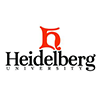Introduction and Overview
Heidelberg University is a public research university in the university city of Heidelberg in Baden-Württemberg, Germany. It is the oldest university in Germany and the third university established in the Holy Roman Empire after the University of Prague and the University of Vienna. The school is a member of the 4EU + Alliance, the German Elite University, the European Research University Alliance, the Coimbra Group, the U15 University Alliance and the European University Association.
History and Establishment
Heidelberg University was officially established in 1386. It was originally a university established in Heidelberg by Pope Urban VI and Palatine Rupert I. It was one of the academic centers of Europe in the second half of the 16th century and was suspended twice in the 17th century. In 1803, Heidelberg University was incorporated into the state of Baden and was called Ruprecht-Karl University, later Ruprecht-Karl-Heidelberg University, or Heidelberg University for short.
School Strength
Faculty: As of December 1, 2022, Heidelberg University has a total of 8,795 faculty members and 6,481 academic staff. It has many professors and scholars with outstanding achievements and international influence in their respective fields, providing students with high-quality teaching and guidance.
Academic achievements: As of 2017, there are 56 Nobel Prize winners and 19 Leibniz Prize winners, 2 Oscar winners, 5 German chancellors, and dozens of European leaders who have studied, taught or researched at the school. Remarkable research results have been achieved in many disciplines such as medicine, physics, chemistry, law, and philosophy.
Teaching resources: The school has advanced teaching facilities and scientific research equipment, providing students with good learning and research conditions. At the same time, Heidelberg University has established extensive cooperative relations with many universities and scientific research institutions around the world, providing students with rich international exchanges and cooperation opportunities.
Nature of the institution
Public university.
Educational philosophy
The Latin motto is "Semper Apertus", which means "always open", reflecting the school's pursuit of knowledge and tolerance of different cultures and ideas. The school is committed to cultivating talents with critical thinking, innovation and global vision, focusing on academic freedom and independent thinking, and encouraging students to actively participate in scientific research and practical activities to achieve personal all-round development and social value.
Key laboratories and disciplines
Key disciplines: Medicine, sociology, geography, applied informatics and other majors are strong. Disciplines such as law, philosophy, and history have an important position and far-reaching influence in Germany and even Europe.
Key laboratories: In 1827, the school established the first university-based psychological clinic in Germany, and in 1906, it established the first cancer trial institute in Germany.
Faculty
As of 2021, Heidelberg University has developed into 13 colleges with more than 180 degree courses, divided into university departments, institutes and postdoctoral studies. The main departments are the School of Theology, School of Law, School of Philosophy, School of Medicine, School of Natural Sciences-Mathematics, etc.
Ranking
Ranked 57th in the US News 2022-2023 World University Rankings; 55th in the 2023 Academic Ranking of World Universities; 47th in the 2024 Times Higher Education World University Rankings; 84th in the 2025 QS World University Rankings.
Costs
As a public university in Germany, Heidelberg University usually charges low tuition fees for domestic and international students, about 1,500 euros per semester, in addition to certain living expenses such as registration fees, book fees, and accommodation fees.
Campus Environment
Campus Facilities: The campus has a variety of architectural styles, and the historic buildings complement modern facilities. It has modern teaching buildings, libraries, laboratories, gymnasiums and other facilities, providing students with good learning and living conditions.
Campus Culture: The academic atmosphere is strong, and students can participate in various academic lectures, seminars and scientific research projects. In addition, the school also has a wealth of club activities and cultural activities, such as music, drama, art exhibitions, etc., providing students with a broad development space and communication platform.
-

Harvard University
-

Massachusetts Institute of Technology
-

South University
-

University of West Georgia
-

Stanford University
-

Northwest Nazarene University
-

Hawaii Pacific University
-

Shorter University
-

Nova Southeastern University
-

Saint Leo University
-

Mesoamerican University
-

Istmo University
-

Mariano Galvez University of Guatemala
-

Regional University of Guatemala
-

Galileo University
-

Francisco Marroquín University
-

Rafael Landívar University
-

University of the Valley of Guatemala
-

University of San Carlos of Guatemala
-

Technological Institute of Tlaxcala Plateau
-

Golfo University
-

Technological University of South Sonora
-

Technological University of Huejotzingo
-

Tizimín Institute of Technology
-

Chilpancingo Institute of Technology

